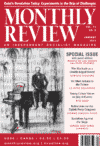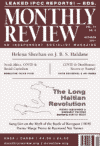
The United Fruit Co.
This poem was published in volume 18, number 4, of Monthly Review (September 1966). | more…

This poem was published in volume 18, number 4, of Monthly Review (September 1966). | more…

A new poem by Raymond Nat Turner. | more…
Jeremy Corbyn, the former leader of the British Labour Party, was subjected to a concerted propaganda campaign by the British right-wing military-industrial establishment and amplified by mainstream media. | more…

A new poem by Black Agenda Report poet-in-residence, Raymond “Nat” Turner. | more…

Cuba’s world leadership in sustainable human development is of world-historic importance. | more…

Notwithstanding an ongoing commitment to redouble its efforts, Cuban socialism has not taken full advantage of its own human and material resources to develop its productive forces. It is necessary to distinguish between our right and duty to struggle against the blockade and our expectations regarding what one can and cannot hope for if it is lifted. | more…

On Sunday, July 11, 2021, demonstrations occurred in various parts of Cuba. Many of the demonstrators went onto the streets to protest the frequent prolonged power outages in various locations, shortages of food and medicine, and the general precariousness of daily life. A variety of different perspectives are putting their own spin on these events. | more…

As the internationalization of monopoly capital grows, particularly through the domination of global value chains, the worldwide rate of exploitation and degree of monopoly increase as well. | more…

The job of socialists is to engage with public policy from a class perspective, informed by a Marxist understanding of contemporary capitalism—not to reform it, but to abolish it. | more…

The increasing consolidation of the modern entertainment industry by a small clique of multinational streaming giants is the next step in the “standardization of style” in mass-consumed art. The work of Pier Paolo Pasolini can help remind us of what we’re missing. | more…

A new poem by Marge Piercy. | more…

What was most significant about the published Part I of the report was that it revealed that even in the most optimistic projection of the Shared Socioeconomic Pathways—in which carbon emissions globally peak in the next four years, a 1.5°C increase in global average temperature over preindustrial levels would be avoided until 2040, and the goal of net zero carbon emissions would be reached by 2050—the consequences for global humanity would nonetheless be catastrophic by the measure of all historical precedents. | more…
Notifications